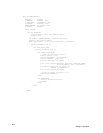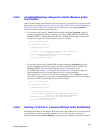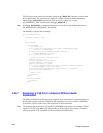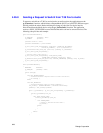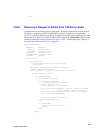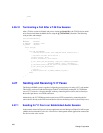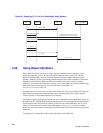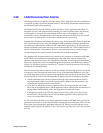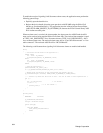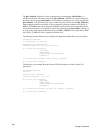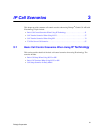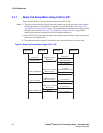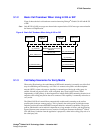
332
Dialogic Corporation
Figure 62. Receiving G.711 Fax in an Established Audio Session
4.28 Using Object Identifiers
Object Identifiers (OIDs) are not free strings, they are standardized and assigned by various
controlling authorities such as, the International Telecommunications Union (ITU), British
Standards Institute (BSI), American National Standards Institute (ANSI), Internet Assigned
Numbers Authority (IANA), International Standards Organization (ISO), and public corporations.
Depending on the authority, OIDs use different encoding and decoding schemes. Vendors,
companies, governments and others may purchase one or more OIDs to use while communicating
with another entity on the network. For more information about OIDs, see
http://www.alvestrand.no/objectid/.
An application may want to convey an OID to the remote side. This can be achieved by setting the
OID string in any nonstandard parameter that can be sent in any Setup, Proceeding, Alerting,
Connect, Facility, or User Input Indication (UII) message.
The Dialogic
®
Global Call API supports the use of any valid OID by allowing the OID string to be
included in the GC_PARM_BLK associated with the specific message using the relevant parameter
set ID and parameter IDs. Dialogic
®
Global Call API will not send an OID that is not in a valid
format. For more information on the valid OID formats see http://asn-1.com/x660.htm which
defines the general procedures for the operation of OSI (Open System Interconnection) registration
authorities.
The application is responsible for the validity and legality of any OID used.
Remote Device Capable of
Signaling, Audio and Fax
App
gc_OpenEx(:N_iptB1T1:M_ipmB1C1)
H.323 SETUPw/TCS or SIP INVITE to send
Origination IP address and RTP port number
Call Connected
FAX
fx_recvfax()
Fax Data via RTP
GC/cclib
gc_MakeCall()
GCEV_CONNECTED
fx_open(dxxxB23C1)
gc_Unlisten()
gc_Listen()
fx_listen()



